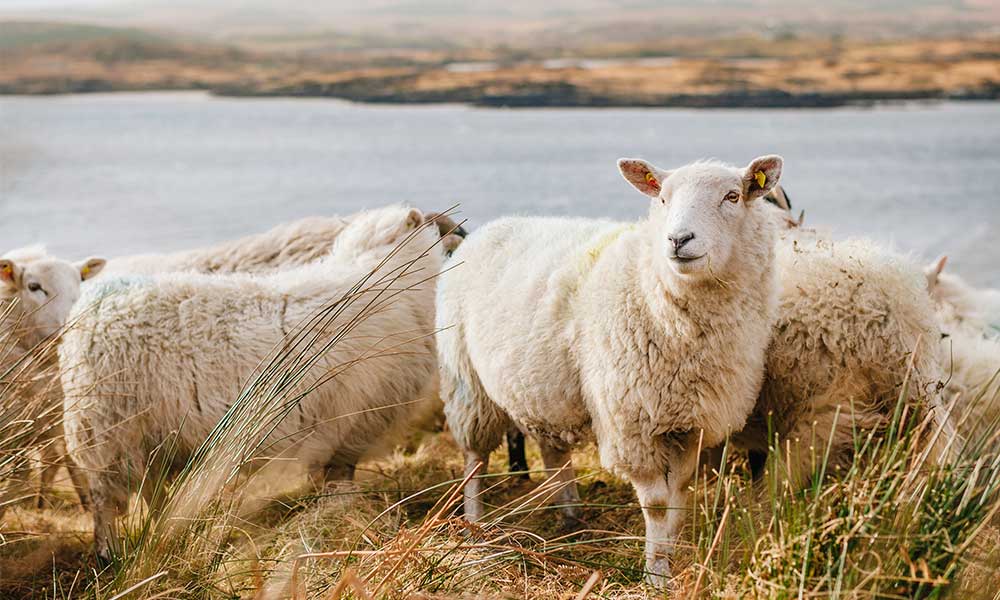(The Lord is My Shepherd - Part 1 | Part 2)
"The Lord is my shepherd. This picture of the ever-faithful shepherd who meets all our needs is a familiar one to Christians. The prophet, Isaiah, also has a well-known description of Him. "He tends His flock:...He gathers the lambs in His arms and carries them close to His heart; He gently leads those that have young" (Isa. 40:11). The shepherd's eyes are ever alert for any rebels in danger of wandering off. Shepherding has played an important role in the life and economy of the Israelites since the days of Adam and Eve.
The Scripture: Genesis 4:2
"Now Abel kept flocks and Cain worked the soil."
1. What does this scripture tells us about Abel and Cain?
One of God's most precious names is Shepherd of Israel.
The Scripture: John 10:11, 14-15, 17-18
"I am the good shepherd. The good shepherd lays down His life for the sheep...and I lay down My life for the sheep. The reason My Father loves Me is that I lay down My life - only to take it up again. No one takes it from Me, but I lay it down of My own accord. I have authority to lay it down and authority to take it up again. This command I received from My Father."
Jesus gives amazing information concerning the Father, the Son, and Jesus' followers in these few verses. Let's look at this information carefully.
2. What does Jesus call Himself?
The meaning of the word good in this verse is "skillful." Jesus says He is a skillful - an expert - shepherd. He knows how to take care of His sheep - how to provide what they need, how to find good pasture and water for them.
3. What is the ultimate sacrifice the "good" shepherd is willing to make?
When David volunteered to fight the giant, Goliath, he shared his own experiences as a shepherd with King Saul.
The Scripture: 1 Samuel 17: 34-36
"Your servant has been keeping his father's sheep. When a lion or a bear came and carried off a sheep from the flock, I went after it, struck it and rescued the sheep from its mouth. When it turned on me, I seized it by its hair, struck it and killed it. Your servant has killed both the lion and bear."
4. How did David risk his life to save his father's sheep?
The Scripture: John 10: 14-15
"I am the good shepherd; I know My sheep and My sheep know Me - just as the Father knows Me and I know the Father - and I lay down My life for the sheep."
5. What does Jesus tell us in this verse?
In these verses Jesus reiterates that He is the "good shepherd."
The Scripture: John 10: 17-18
“The reason my Father loves me is that I lay down my life–only to take it up again. No one takes it from me, but I lay it down of my own accord. I have authority to lay it down and authority to take it up again. This command I received from my Father.”
6. What does Jesus tell us about laying down His life?
Here, for those who would understand, Jesus refers to His death and resurrection. He says He lays down His life and takes it up again. No one does it to Him.
7. Where does His authority come from?
The Scripture: John 10: 27-30
“My sheep listen to My voice; I know them, and they follow Me. I give them eternal life, and they shall never perish; no one can snatch them out of My hand. My Father, who has given them to Me, is greater than all; no one can snatch them out of My Father's hand. I and the Father are one.”
8. What else does Jesus tell us about the "good" shepherd?
9. Whose voice do the sheep listen to?
10. What does Jesus give them?
11. What wonderful words of assurance does He give them?
Unless we choose to leave Him, we are safe in the hand of our shepherd. The relationship between the skilled Old Testament shepherd and the sheep is an intimate one. The shepherd is on duty 24 hours a day. Each day he counts his sheep and if one is missing he immediately goes out to search for it. Each sheep bears a distinctive mark on his ear. The shepherd examines each sheep for injuries and sores and medicates them if necessary.
The skillful shepherd prepares pastures for his sheep and leads them to good water sources. His prime weapons are his rod and his staff, with which he protects and guides the sheep. Unlike other mid-eastern shepherds, he leads, rather than drives them.
In the following verses Jesus introduces another element into the discussion - the relationship between the Father and the Son.
The Scripture: John 5: 19-20
"The Son can do nothing by Himself; He can do only what He sees His Father doing, because whatever the Father does the Son also does. For the Father loves the Son and shows Him all he does."
12. What does Jesus do?
In the East, the different flocks of sheep frequently mingle together; yet when it is time to separate, each sheep goes with his own shepherd because he listens for that particular voice. The sheep follow their own shepherd and none other.
We can glean much more about shepherd from other scriptures.
The Scripture: Isaiah 40:11
"He tends His flock like a shepherd; He gathers the lambs in His arms and carries them close to His heart; He gently leads those that have young."
13. How does the shepherd treat the sheep?
What a beautiful picture of a "skillful" shepherd, reminiscent of Nathan's rebuke to David, when David sinned with Bathsheba.
The Scripture: 2 Samuel 12: 1-3
"There were two men in a certain town, one rich and the other poor. The rich man had a very large number of sheep and cattle, but the poor man had nothing except one little ewe lamb he had bought. He raised it and it grew up with him and his children. It shared his food and drank from his cup and even slept in his arms. It was like a daughter to him."
14. How did the poor farmer treat his little ewe lamb?
Sheep were considered very valuable to the shepherd as indicated in these parables.
The lost and found is a favorite theme of the Bible. Three of Jesus' best known parables are devoted to the lost being found.
The Scripture: Luke 15: 3-7
"Then Jesus told them this parable: 'Suppose one of you has a hundred sheep and loses one of them. Does he not leave the ninety-nine in the open country and go after the lost sheep until he finds it. And when he finds it, he joyfully puts it on his shoulders ad goes home. Then he calls his friends and neighbors together and says, "Rejoice with me; I have found my lost sheep." I tell you that in the same way there will be more rejoicing in heaven over one sinner who repents than over ninety-nine righteous persons who do not need to repent."
15. What happens when the shepherd loses his sheep?
16. What does he do when he finds it?
17. What does he say to his neighbors?
18. With what does Jesus relate the finding of the sheep?
The other two parables are similar - the losing and finding of a valuable coin and the familiar parable of the prodigal son.
The Scripture: Luke 15:20
"While he (the son) was still a long way off, his father saw him and was filled with compassion for him; he ran to his son, threw his arms around him and kissed him. The son said to him, 'Father, I have sinned against heaven and against you. I am no longer worthy to be called your son.' But the father said to his servants, 'Quick! Bring the best robe and put it on him. Put a ring on his finger and sandals on his feet. Bring the fattened calf and kill it. Let's have a feast and celebrate. For this son of mine was dead and is alive again; he was lost and is found.'"
19. What did the father give the son?
All of these gifts signified authority and sonship. What beautiful illustrations of how much our Shepherd treasures us!
Sometimes we can learn much from a bad example. Let's look at a prophecy the prophet Ezekiel made at an earlier date against the leaders of Israel, comparing them to bad shepherds.
The Scripture: Ezekiel 34: 3-5
"Should not the shepherds take care of the flock? You eat the curds, clothe yourselves with the wool and slaughter the choice animals, but you do not take care of the flock. You have not strengthened the weak or healed the sick or bound up the injured. You have not brought back the strays or searched for the lost."
20. Using the prophecy as your source, list the qualities of a skillful shepherd given in this scripture.
Our skillful shepherd has one additional quality that will be evident on Judgment Day.
The Scripture: Matthew 25: 31-32
"When the Son of Man comes in His glory, and all the angels with Him, He will sit on His throne in heavenly glory. All the nations will be gathered before Him, and He will separate the people one from another as a shepherd separates the sheep from the goats."
21. How will the Son of man separate the nations?
Some breeds of sheep and goats are so similar that only the most skillful shepherd can tell them apart.
How grateful we should be that we are in the hands of a skillful shepherd.
In the second half of this study, we will see the similarities between man and sheep.
(The Lord is My Shepherd - Part 1 | Part 2)
The Answers
- Abel was a shepherd and Cain worked the soil.
- The good shepherd
- To lay down His life for the sheep
- If a bear attacked, David went after it and rescued the sheep. If it turned on him, he killed it.
- He knows His sheep and His sheep know Him just as He and the father know one another.
- He says He lays down His life only to take it up again.
- The Father
- The shepherd knows his sheep and the sheep know the shepherd.
- His
- Eternal life
- No one can snatch them out of His hand. He and the Father are one.
- Whatever He sees the Father doing
- Tenderly and gently
- Like a daughter. It shared his food and drink and even slept with him at night.
- He goes in search of it.
- He takes it home.
- "Rejoice with me."
- The rejoicing in heaven when a sinner repents.
- A robe, a ring, and sandals and he prepared a feast to celebrate.
- He takes care of the flock, strengthens the weak, heals the sick, binds up the injured, brings back the strays, and searches for the lost.
- As a shepherd separates the sheep from the goats.
All scripture quotations in this publication are from the Holy Bible, New International Version
(unless otherwise indicated)
Copyright © 1973, 1978, 1984, New International Bible Society
Copyright © 2002 by JoAnne Sekowsky





